Inside BPS Blog
News from the Meristem editors from inside the 2017 Banff Pork Seminar.
- Ruurd's wrap-up 2017
- Pork industry retooling not over, but continuing
- Terry O'Reilly: Perceptions can be changed, but not easily
- Winning the battle of public misconception about food
- Minimizing challenges caused by animal rights groups
- Student science winners at BPS 2017
- Transport wash innovation wins Aherne Prize at 2017 Banff Pork Seminar
- 2017 Foxcroft Honorary Lectureship: Stephen Webel
- Sustainable intensification: Growth without depleting natural resources
- Animal protein's challenging role in feeding a hungry planet
- Mark Chambers: New talent key to a progressive pork industry
- BPS 2017 kicks off with a bang
- Strong interest in opening canola session
- Register for free Canola meal research update at BPS 2017
- PIC welcomes friends, partners to BPS 2017
- Walk-in registrations welcome at BPS 2017
- Topigs Norsvin: Focus on sustainability
- New BPS app launched for 2017 Seminar
- Quick last minute tips for delegates to BPS 2017
- Still time to register for BPS 2017
- Media carry the messages from Banff Pork Seminar 2017
- Understanding transportation's growing impact on the pork industry
- The people who drive the BPS 2017 program
- Thanks to 2017 Banff Pork Seminar sponsors
- Sow housing: Managing the big switch
- Labor session expected to draw strong interest
- Special Meyer, Grier plenary session will wrap up BPS 2017
- Don't miss early BPS 2017 registration Nov. 15
- Breakout session tackle core business, production topics
- Powerful plenary sessions anchor 2017 Banff Pork Seminar program
- Making business sense of a trip to Banff Pork Seminar 2017
- Book hotels early, avoid the Canada 150 rush
- Mark Chambers new chair for BPS 2017
- Media registration for 2017 Banff Pork Seminar
- Calling on nominations for the 2017 Banff Pork Seminar Aherne Prize
- Registration checklist for 2017 BPS
- Getting the scoop on Banff Pork Seminar 2017
Ruurd's wrap-up 2017
Date posted: January 13, 2017

Dr. Ruurd Zijlstra
A short signoff to a successful program. That was the message from Ruurd Zijlstra, co-program chair as he thanked delegates to the 2017 event.
Three key points. One is to remember the contributions sponsorship make to the benefits all delegates enjoy.
Second, is to fill out the feedback forms. "Some of the strong presentations this year came from suggestions from those forms," he says. "We need your help to continue that success."
Finally, come back next year. Dates for the 2018 Banff Pork Seminar are Jan. 9 to 11, 2018 at the Banff Springs Hotel.
Pork industry retooling not over, but continuing
Date posted: January 13, 2017
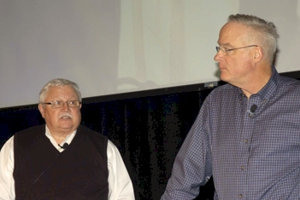
Steve Meyer (left) and Kevin Grier
Two of North America's best known pork market analysts told delegates at the Banff Pork Seminar that they believe the retooling in the Canadian and U.S. pork industry is neither over or about to increase. It is just continuing.
Steve Meyer of EMI Analytics, and Kevin Grier of Kevin Grier Marketing and Consulting are comfortable and entertaining speakers on pork market analysis and their tandem discussion on the retooling question closed out the 2017 Seminar in Banff, Alta.
Meyer cited five drivers that have driven the biggest changes in the U.S. pork industry and says all will continue to shape that industry in years ahead.
One is contract production. Born in the poultry business it changed how the industry viewed facility construction, labor, capital, economies of scale and geographic dispersion, says Meyer. Second is technology, "The term I use loosely to describe how we do things." That includes things like the application of statistical analysis to control swine production.
Driver three is superior genetics; four is federal grain price supports. Driver five is the specialization of everything, the biggest driver recently.
"Size allows people, vehicles, buildings, records, virtually everything to be optimized," says Meyer. "Labor and management specialization has been a key part of that and size allows specialized marketing, logistics, public relations and government relations, all with big advantages."
Canada can compete
One common question in Canada, says Grier, is whether the Canadian industry can compete. While Grier often hears that this industry is not competitive, he says the data does not support that. Trade balance figures show we can compete and Canada is clearly a global presence. Canadian production from 2012 to 2016 increased seven percent, while the world increased one percent and the EU four percent.
Canada increased exports the past four years while the U.S. decreased theirs. Canada's share of the Chia market increased. "We lost a bit globally due in part to the fact we lost Russia. International cost of production figures show Canada can compete. We aren't Iowa but then nobody is Iowa," says Grier.
Packer developments
There is some work to be done on the competiveness side in the packing industry in Canada. "They know that," he says.
Grier expects strong demand for Canadian weaners and feeders thanks to the growing U.S. hog industry and the weak Canadian dollar. He sees plant closures likely in the Quebec market, perhaps expansion in other areas. Expect the move to fewer, larger, more integrated operations to continue, he says.
On the trade front, while the Comprehensive Economic and Trade Agreement (CETA) is coming, he does not expect it to be a big deal for the Canadian hog industry.
Positive demand
One of the most important developments in the North American industry is the improvement in pork demand. In fact, it is not just an improvement in pork demand but in meat and poultry demand in general. It has been an unfortunate factor of the red meat industry, and pork in particular, that demand has been in decline for 20 or more years.
In 2014-2016 the erosion appears to have stopped. Not only have Canadians eaten more pork but given how high prices were, Canadian consumption was very robust. The U.S. demand behavior is almost exactly the same.
Demand is important because an industry with declining demand is an industry in decline. Conversely an industry with increasing demand is not necessarily growing, but at least it has the opportunity to grow.
Grier explains that demand is the combination of price and consumption. Just because consumption is rising or falling, does not mean demand is rising or falling. The price must be combined with the consumption to get a true picture of demand.
Demand is important to the health and growth of the pork industry. People readily look at supplies and slaughter as indicators of the potential for pricing and profit gains or losses. Part of the reason the industry looks so closely at supply and slaughter is because it is easy to grasp.
"We can all appreciate what it means to hog prices when we have short or long supplies," says Grier. "Obviously supplies and slaughter are critical but they only tell half the story. Demand on the other hand is more nebulous and we typically cannot get a statistical feel or gauge on demand until after the fact. Demand can make or break a market just as supplies can make or break a market."
Terry O'Reilly: Perceptions can be changed, but not easily
Date posted: January 13, 2017
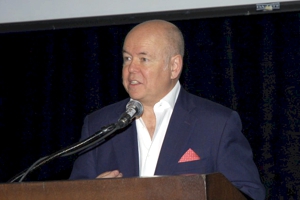
Terry O'Reilly
Terry O'Reilly: Perceptions can be changed, but not easily
Ad man, radio personality and marketing guru Terry O'Reilly spoke to a packed room at the 2017 Banff Pork Seminar, and shared his belief that any negative perception of a brand can be changed.
How do you change a negative perception in the marketplace? "A negative perception can be changed if you have a great insight, a really smart leverage point and if you are absolutely consistent with your messaging from that point on," says O'Reilly.
Brand
O'Reilly defines brand as what an organization stands for, and possibly more importantly, what it stands against. For example Nike says "Just Do It" - and is against being a couch potato. "In another words it is a crystal clear vision of what makes you unique, and what you stand against usually says more about your organization."
Using Einstein as an example, O'Reilly explained why the perception of a brand is so important. Einstein was one of many important scientists in the 20th century but likely the only one most people can name. He is perceived to be the greatest scientist of his time because his brand has become so well known. And perceptions are sticky.
Perceptions: burrs on a sweater
"Perceptions are sticky little things. They are like burrs on a wool sweater, they are tough to remove," says O'Reilly. Advertising's goal is to build perceptions for a product or organization. A positive perception makes price less important, and banks goodwill.
"If your brand is unique, compelling and well defined, and people feel positively about it, they will listen to your messages, respect your industry and buy your product," says O'Reilly.
If the perception of a brand is unclear, it fogs up the messaging and identity and impacts perception. "In this time-starved world the perception of a brand acts like shorthand. It is an impression we carry with us," says O'Reilly. If the perception of a brand is working against its identity, then it is time to change the perception.
Marlboro Country
"Changing a perception is the most difficult task you can give to marketing because people treat them like possessions. They don't part with them easily," says O'Reilly.
Using the example of Marlboro cigarettes, he explained how the cigarettes were considered a ladies' product, and were failing in the marketplace. The ad agency decided to try to change the conversation about the product to attract male consumers and the Marlboro man was born.
It was around this time that marketers realized the consumers quite often "drink the label and smoke the advertising. The image of the brand hinges on the perception of the product, not the actual product qualities themselves. The perception of a brand is an idea, and because it is an idea it could be influenced," says O'Reilly.
The Marlboro campaign, what O'Reilly describes as perhaps advertising's darkest success story, was nevertheless a useful marketing success case study because it influenced how people perceived the product and changed the conversation completely.
"Changing the conversation is never easy. It takes insights, strategic planning and patience. But it can be done," he says.
I love New York
In order to change the conversation a leverage point is also needed. "A leverage point is something already in the consumers' minds that is so persuasive it cannot be denied" he says. A great example of this was the campaign in the 1980's to try and revive the image of New York City to attract tourists, despite its reputation as dirty and unsafe.
After consulting focus groups, it became clear that Broadway was the one thing people loved about NYC and that became the leverage point of the campaign. It overrode all the other perceptions people had about the city. "This is a great example of how finding the greatest area of opportunity when you are fighting a perception problem can change the conversation. The 'I love NYC' campaign wasn't about the city. It was about Broadway."
"When you uncover a leverage point, it's like rocket fuel."
Leave your bias at the door
Finding that rocket fuel isn't easy says O'Reilly An organization must be Switzerland, completely neutral when doing research and looking for the leverage point. "You must let the research reveal itself. Do not stickhandle the results or let your biases impress the results." In his experience, he has usually been surprised at how wrong his assumptions were.
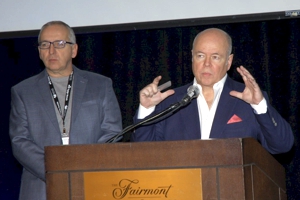
Frank Novak, (left) session chair hosts questions for Terry O'Reilly
The key is asking the right questions and listening closely to the answers. Quite often it goes back to what the perception of the product is and asking the right question can reveal the insight.
Process, not event
Patience is needed. "You can change a perception but it is a delicate process. You have to be absolutely consistent in your messaging. You need patience because changing a perception is not an event. It's a process. It takes time." And lastly O'Reilly says, "If you want people to think about you in new ways, you need to talk to them in new ways."
The first step in changing a perception is to dig for the insight. To look for meaning not just facts.
"Your brand in the pork industry is so important and so powerful and it is one of your most valuable assets. And like anything of value it needs care and nurturing and it needs to be protected," says O'Reilly. He adds that when changing the perception or conversation around the pork industry seems insurmountable, remember New York City.
Winning the battle of public misconception about food
Date posted: January 12, 2017
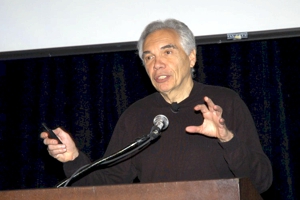
Dr. Joe Schwarcz
McGill University Professor Dr. Joe Schwarcz has spent a long career working to correct public misconceptions about science. He hasn't been short of work.
These days the field of food and agriculture provides rich fodder for that discussion. Schwarcz weighed in on the issues of the day at the 2017 Banff Pork Seminar in Banff, Alta. Jan. 12. His goal was to talk to the pork industry about what he has learned about winning the battle of public misconception about food.
Not surprisingly, genetic modification was a key part of the discussion. The herbicide glyphosate is at the center of a large body of criticism, says Schwarcz in a paper provided to delegates in conference proceedings. It is an example of how misguided science is creating wild misconceptions about food.
"Half of All Children Will Be Autistic by 2025, Warns Research Scientist at MIT."
That headline has triggered both fear among the public and scathing attacks about irresponsible fear-mongering by scientists, he says. So, why are we destined for such a tragedy, and just who is this prophet of doom at MIT?
The story is really about glyphosate, a non-selective herbicide that proved effective at weed control, but really didn't get any traction as a villain in the public eye until Monsanto introduced crops genetically altered to be resistant to the herbicide.
History repeating
Historically the introduction of any new technology, be it pasteurization, vaccination, microwave ovens or cell phones, has raised concern, and so it was with genetically modified organisms (GMOs), says Schwarcz. There were allegations that the effects of GMOs on people's health had not been adequately tested and that we were all "guinea pigs."
But scientific organizations and regulatory agencies around the world dismissed the concern that genetic modification alters the composition of the edible portions of these plants in any significant way.
Recently, worries about safety have expanded to include the supposed toxicity of glyphosate itself and its residues in food. French researchers stirred up a dust storm with the claim that eating corn genetically modified to resist glyphosate can cause tumors as well as kidney and liver problems.
A sampling of Schwarcz logic
A powerful presentation from Joe Schwarcz at the Banff Pork Seminar 2017 had many nuggets of knowledge. Here is a condensed version of some of his comments.
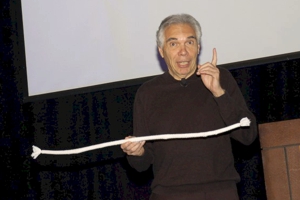
Dr. Joe Schwarcz uses magic tricks to explain science
- The task of separating sense from nonsense is more difficult than ever. There is so much information today, much of if not useful. So you can cherry pick results. And you can publish anything; all you have to do is pay the page rate.
- Biggest thing I face is that something that is natural is safe. Much of our life is spent dealing with the ravages of nature.
- Number of pesticides does mean risk. There may be 36 pesticides registered to be used with apples, but in reality only two or three would be used.
- It always comes down to risk and rewards.
- One thing that really ticks me off is the battle between organic and conventional agriculture. There is room for both. But organic will be a niche market because we cannot feed the world that way.
- Hazard and risk are different. Hazard is the potential to do ham. Risk is hazard multiplied by exposure. A grizzly bear has a high hazard for harm in the wild, but in a zoo the risk is managed. Sunshine is a hazard but you can manage the risk.
- We have to keep an eye on genetic modification. But life is full of risks; it's a matter of benefits.
- Chemicals are not to be feared or worshipped. They are to be understood.
- The dose makes the poison.
Minimizing challenges caused by animal rights groups
Date posted: January 12, 2017
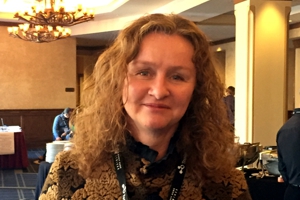
Geraldine Auston, Ag and Food Exchange
At one time the chance of farmers engaging with activists was relatively remote. That's not the case today. Media and social media show constant interaction with activists in a way that has potential to threaten the individual and their industry.
Geraldine Auston of the Ag and Food Exchange gave pork industry players attending the 2017 Banff Pork Seminar some solid background in the difference between animal welfare and animal rights. And she had some tips on how to manage on-farm or during transport and when dealing with activists.
Do the right thing, always
A lot has been learned on how producers and transporters can manage their affairs to be better prepared for questions about their operation. Here are some specifics about good management techniques and transparency.
Have a code of conduct. Outline your farm's or company's expectations for animal welfare. Every person in contact with livestock should sign off on this document.
Hire the right people, for the right reasons. Skills and strength are important in certain jobs, but go beyond that. Consider a person's temperament, and do not allow individuals with challenges such as anger management issues to work in close contact with animals.
Train and retrain. Ensure every person understands the law, regulations, code of practice and expected procedures and policies. If an individual has trouble initiating a task such as euthanasia, retrain that individual or reassign him or her.
Establish a reporting system. Within your business establish how employees can raise animal welfare concerns. Ensure all concerns raised receive appropriate recognition and follow-through.
Document problems. When something goes wrong, document it. Outline what happened, and what you will commit to doing to ensure it does not happen again.
Focus on transport
Over the past few years, animal rights activists have been holding protests outside of processing facilities. Most activists attending these events are committed to quietly observing trucks entering slaughter facilities.
Recently, a growing number of activists, particularly in Ontario, have attempted to block trucks, or attempt to feed and water animals, climb onto trailers to take images or make contact with livestock and sometimes argue with transport drivers.
What you can do
Here's what Auston recommends.
- Establish communication and expectations with the plant.
- Assume you are being filmed, and act accordingly. Activists frequently post videos of their encounters to social media pages.
- If activists are blocking your truck, or if they are too close to safely move forward, stay inside your truck and contact plant security or police for assistance.
- Do not engage in conversation beyond asking activists to move out of the way.
- Avoid using truck horns. It causes distress for the animals and inhibits your ability to communicate with plant security and police.
- Once protestors move away, verify it is safe to proceed and move the truck ahead.
- If protestors approach the truck again, stop the truck, warn them again, and call police.
- Do not engage in physical or intimidating contact with any protestor.
- If you feel you or your property are threatened, contact police.
Social media
Farmers and transporters active on social media should not engage in arguments with animal rights activists. End online conversation with individuals who antagonize. Block them if you need to. Ensure your security settings such as photos, physical location and personal information are not available to public view.
Student science winners at BPS 2017
Date posted: January 12, 2017
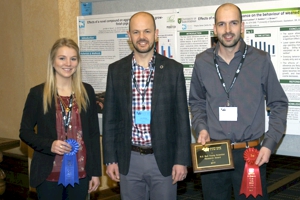
Stephanie Gartner, University of Alberta, (left) Dr. Ben Willing, University of Alberta (center), and Jean-Philippe Martineau, Universite Laval.
Two young scientists at the 2017 Banff Pork Seminar (BPS) were presented with the R. O. Ball Young Scientist Award.
The award is named after Dr. Ron Ball, a long-time researcher and former BPS program director. The award recognizes graduate students who provide a best overall combination of good and relevant science, well-written abstract and excellent presentation.
First prize was awarded to Jean-Philippe Martineau, Universite Laval for "Partial substitution by organic trace minerals on gilt growth, production and longevity and progeny growth performance."
Second prize went to Stephanie Gartner, University of Alberta for "The effects of administering amoxicillin early in life on inflammation and insulin secretion in the porcine pancreas."
First place winner receives a $500 cheque and plaque and second price receives a $250 cheque.
Transport wash innovation wins Aherne Prize at 2017 Banff Pork Seminar
Date posted: January 12, 2017
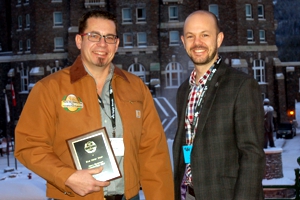 Bill Rempel of Blue Water Wash, Blumenort, Man. (left) and Dr. Ben Willing, University of Alberta, chair of the Aherne Prize Committee.
Bill Rempel of Blue Water Wash, Blumenort, Man. (left) and Dr. Ben Willing, University of Alberta, chair of the Aherne Prize Committee.Disease control in livestock production just got a little better thanks to winners of the 2017 F. X. Aherne Prized for Innovative Pork Production. The prize was awarded to Blue Water Wash of Blumenort, Man. on Jan. 12 at the 2017 Banff Pork Seminar, Banff, Alta.
Bill Rempel of Blue Water Wash accepted the award for the company's innovative new heavy equipment undercarriage wash.
The prize has become a major event in the pork industry says Dr. Ben Willing, chair of the F. X. Aherne Prize committee. It is named after industry icon, the late Dr. Frank Aherne, a professor of swine nutrition and production at the University of Alberta and a major force for science-based progress in the western Canadian pork industry.
"This prize recognizes individuals who have developed either original solutions to pork production challenges or creative uses of known technology," says Willing. "The quality and number of applicants is strong each year and keeps this award popular. And these grass roots innovations help anchor a promising future for livestock production to feed a growing world."
There has never been a way to wash all organic material from underneath livestock trailers according to Blue Water Wash. Organic material has the potential to carry and spread diseases which is a threat to the industry.
The company has researched and developed an undercarriage wash which is operational in their new state-of-the-art drive-through wash bays in their Blumenort, Man facility.
The system uses 24 high pressure spinning nozzles along with 90 gallons per minute of water to thoroughly clean the underside of any livestock trailer that runs through it. To finish off the undercarriage wash, disinfectant is then applied to the underside of the trailer as it exits the wash bay.
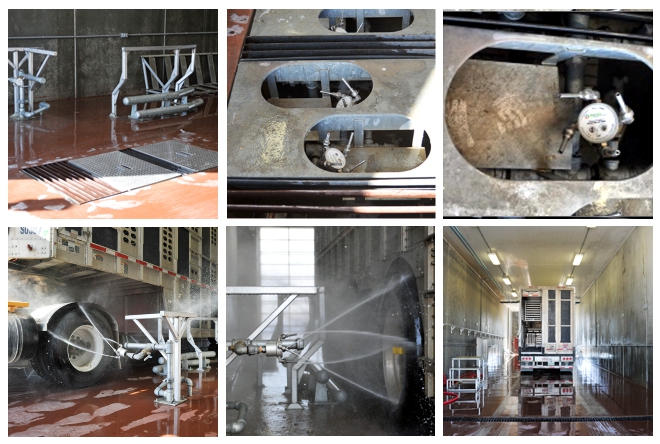
2017 Foxcroft Honorary Lectureship: Stephen Webel
Date posted: January 12, 2017
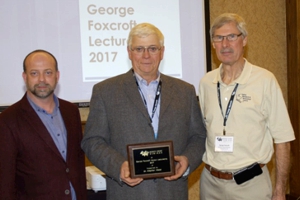
Dr. Michael Dyck, University of Alberta (left), George Foxcroft Lectureship speaker Dr. Stephen Webel, (center), and Dr. George Foxcroft
Leadership comes in many forms. For the pork industry one of the most important types of leadership is research into innovations and management techniques that can make real improvement at the production level.
Those are the topics featured in the Banff Pork Seminar breakout sessions each year. And each year one of those presentations is dedicated to the George Foxcroft Honorary Lectureship, named after the University of Alberta professor, research pioneer and industry icon.
"We established the George Foxcroft Lectureship in Swine Production to allow the Banff Pork Seminar, in conjunction with the University of Alberta, to host speakers who are conducting high profile research that is applicable to the pork production industry and will potentially improve production efficiency," he says.
"In 2017 we are pleased to recognize Dr. Stephen Webel as the recipient of the Foxcroft Lectureship," says Seminar co-program chair, Dr. Michael Dyck of the University of Alberta. "Each of these recipients receives this award based on the quality of their research and the contributions made to the swine industry." Webel's presentation, "The reproductive management of gilts and sows" is in breakout session five.
His credentials are impressive. He is the director of reproduction research and development for JBS United, Inc. He earned his B.S. from the University of Illinois, M.S. from Iowa State University and Ph.D. from the University of Illinois. His basic and applied research has led to development of estrous cycle and ovulation control products to permit fixed time insemination for swine, sheep, cattle and horses.
Webel is currently involved with developing and implementing programs for fixed time insemination in gilts and weaned sows.
Sustainable intensification: Growth without depleting natural resources
Date posted: January 11, 2017
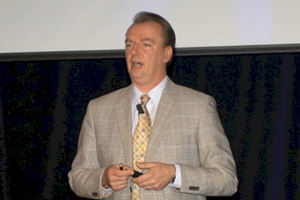
Frank Mitloehner
They were promising and welcome words for a pork industry at times under siege.
University of California, Davis professor Dr. Frank Mitloehner told the 2017 Banff Pork Seminar that the world can reach its targets of feeding the expected nine billion people on the planet by 2050. It will happen in part, he says, through intensification of livestock production.
"Indeed intensification provides large opportunities for climate change mitigation and can reduce associated land use changes such as deforestation. Production efficiencies will reduce environmental pollution per unit of product," he says.
To do that requires separating fact from fiction in the greenhouse gas emission world, and it requires an understanding of real progress in livestock production efficiency, he says. Production success needs to be put in a global context, and it requires a fair way to assess emissions.
Fact and fiction in GHG
The 2015 Global Climate Change Conference resulted in 196 countries signing on to reduce fossil fuel use. While there is strong scientific consensus regarding the relative importance of fossil fuel use, anti-animal agriculture advocates portray livestock as to blame for the lion's share of greenhouse gas (GHG) emissions, says Mitloehner.
One common argument is that U.S. livestock GHG emissions from cows, pigs, sheep and chickens are comparable to all transportation sectors such as cars, trucks, planes and trains. That argument suggests that limiting meat consumption, starting with "Meatless Mondays" will have a significant impact on total emissions.
The reality is leading scientists have quantified the impacts of livestock production in the U.S., which accounts for 4.2 percent all GHG emissions, very far from the 18 to 51 percent range that advocates often cite. Comparing the 4.2 percent GHG contribution from livestock to the 27 percent from the transportation sector, or 31 percent from the energy sector brings all contributions to GHG into perspective.
Breaking down the 4.2 percent EPA figure for livestock by animal species, shows the following contributors: beef cattle 2.2 percent, dairy cattle 1.37 percent, swine 0.47 percent, poultry 0.08 percent, sheep 0.03 percent, goats 0.01 percent and other (horses, etc.) 0.04 percent.
"If all Americans practiced Meatless Mondays, we would reduce the U.S. national GHG emissions by 0.6 percent," says Mitloehner. "A beefless Monday per week would cut total emissions by 0.3 percent annually. One certainly cannot neglect emissions from the livestock sector, but to compare them to the main emission sources would put us on a wrong path to solutions, namely to significantly reduce our anthropogenic carbon footprint to reduce climate change."
Livestock's real progress
Fewer inputs, fewer impacts.
That's the bottom line for U.S. livestock production when all things are considered, says Mitloehner.
Animal protein's challenging role in feeding a hungry planet
Date posted: January 11, 2017
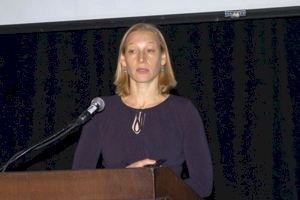
Sandra Vijn
Canada's pork industry got a hard lesson from an industry outsider in the reality of feeding a hungry world and suggestions on how they can do it better.
"We'll need to produce more food in the next 40 years than we have in the last 8,000 years," Sandra Vijn, director, sustainable food for the World Wildlife Fund told the 2017 Banff Pork Seminar in Banff, Alta.
Animal agriculture will need to bring its use of resources and impacts in line with the earth's finite capacity and to demonstrate to consumers how their products can be part of sustainable diets. The pressure to do things differently will increase, she says.
The harsh numbers
Of all human activity, producing food has the single largest impact on our planet, says Vijn. Food production accounts for about 40 percent of the habitable land, 70 percent of water consumption and 30 percent of the greenhouse gas emissions globally. It's a leading contributor to climate change, soil erosion and the loss of biodiversity in vital ecosystems.
Livestock is the world's largest user of land resources, with pasture and land dedicated to production of feed representing almost 80 percent of the total agricultural land. Taking feed into account, it takes hundreds of gallons of water to yield a pound of meat, and livestock contribute about 14 percent of human-induced global greenhouse gas emissions.
By 2050, there will be two to three billion more people. This population growth alone will place significant pressure on our finite resources, but the greater challenge stems from coupling increased population with rising incomes. More than nine billion people will have nearly three times more income per capita and will consume twice as much as we do today.
Within the next four decades we must double net food availability, but we cannot double the amount of land in production. We must produce more with less.
Regeneration warning
Ecosystems can regenerate natural resources to produce food, fiber and fuel, but Vijn outlines how resources are being consumed at rates that cannot be replenished.
By 2050, global demand for meat is forecast to increase by 70 percent, and about 50 percent for pork. That will increase livestock's demand and competition for land, water, and feed crops.
Globally, many of today's most important crop-producing areas might not be as productive in the future. Several important aquifers on which grain agriculture depends are shrinking and precipitation patterns are changing. Soils are eroding.
"We need to intensify food production and produce more with less, not just on a per capita basis, but in absolute terms—less land, water and other resources overall than we do today if we are to live within the limitations of the planet," says Vijn. "But, we need to produce more nutrition in sustainable ways."
Ways to improve
There is no silver bullet, she says and no single strategy will solve the problem. By combining strategies we can achieve the results both we and the planet need.
"Sustainability is a precompetitive issue. We can work together to find solutions, share information and learn more quickly than ever before. Actions at speed and scale are needed to reduce the absolute impacts of the livestock industries globally."
Vijn offered three key ways to reach that goal.
Mark Chambers: New talent key to a progressive pork industry
Date posted: Jaunuary 11, 2017
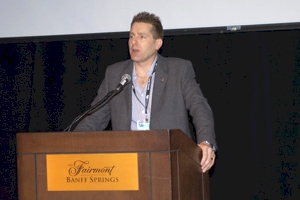
Mark Chambers, 2017 BPS chair
Banff Pork Seminar (BPS) 2017 chair, Mark Chambers opened this year's event with some personal memories and a personal challenge for the delegates attending to do more to sell their industry to attract new talent.
"The first Banff Pork Seminar I attended was 20 years ago," Chambers reminisced. "The reception was in the foyer of the Banff Center. They fit because there were about 240 delegates that year.
"Fast forward to today and look around you. There are nearly 650 delegates signed up to attend this year in this beautiful facility for what has become a premiere event for networking, knowledge gathering and teambuilding."
Thinking back to 1997 the industry has changed significantly, says Chambers. Costs to produce a pig have gone up dramatically, but revenue has not kept pace.
"The way we continually move forward is with research, innovation, genetic progress, improved management and above all, resilience. Our industry players, which include all of you in this room, are very innovative, resilient folks. It is events like this that bring the different components of our industry together to share knowledge throughout this Seminar week."
New talent critical
Chambers says as he looks around the room he sees a lot of familiar faces and some new ones.
"To me one striking concern is the lack of new ones," he says.
The production side of our industry is challenged to attract new talent, says Chambers, who has been an active player in industry personnel policy, training and recruitment. "We have the stigma of modern farming and a lot of new activist groups putting pressure on farming so there is a growing lack of trust on farming practices. All of us in this room need to ensure we are focused and paying attention to attract new talent. Making sure we spin the positives of our industry to all possible new recruits.
"We should not sell ourselves short and make sure each time we travel or meet someone we are blowing our industry's trumpet and our own on what we do for the public today to ensure they are fed safe, affordable and nutritious food.
"I'm sure everyone in this room who employs labour will relate to this. And we do have a breakout session focused on labour so if you are attending this make sure you interact and have good discussions around this topic."
Issues of the day
The theme for this year's 46th seminar is "Innovative and sustainable solutions for an evolving industry." It's a very fitting theme, says Chambers. The industry has been recovering from serious threats from foreign animal disease such as PED. There is continual pressure from activist groups and growing pressure for increased meat consumption while maintaining natural resources. And there is growing recognition agriculture needs to change the conversation to connect with consumers' emotion as they make food purchases, not battle with scientific data.
On the market side, the past three years have seen strong profitability but the question is will that continue? What will be the impact of increased packing capacity coming on stream in the US?
"We have top speakers to address all those issues and offer a wide range of practical advice that producers can take home and make improvements in their operations," says Chambers.
Thanks for support
Chambers introduced and thanked his organizing committee for their efforts noting especially their employers who allow them to spend this time. He made a special effort to thank BPS sponsors, whose strong support means all BPS delegates are able to attend at a significant discount.
And he encouraged all delegates to provide feedback, without which a prestigious seminar is not possible. "The committee is always looking for new topics, speakers and innovative ways to attract people to the seminar," he says, "so we depend on your feedback, good or bad, to accomplish that."
BPS 2017 kicks off with a bang
Date posted: Jaunuary 10, 2017
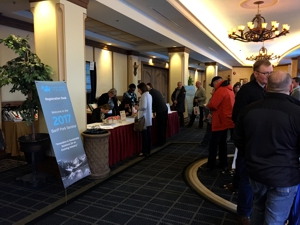
There may be challenges ahead for the pork industry you'd never know it from the bustling, positive atmosphere as Banff Pork Seminar 2017 kicked off Jan. 10 with a welcome reception.
Nearly 650 delegates began three days of formal conference activities tackling the major issues of the day.
"Our committee is grateful for the strong delegate support and we are excited to be back at the beautiful Banff Springs Hotel," says seminar coordinator, Ashley Steeple.
"One reason for choosing this hotel was the fact that meeting rooms and social areas are arranged in a convenient format," she says. "Another was that so many social options are available right in the hotel making it easy for people to find networking and personal time.
"We believe that will lead to an enjoyable and useful experience for delegates. As always, the organizing committee looks forward to feedback throughout the seminar about any aspect of the event."
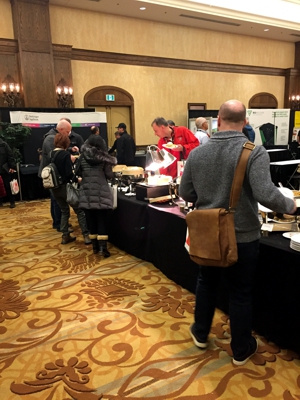
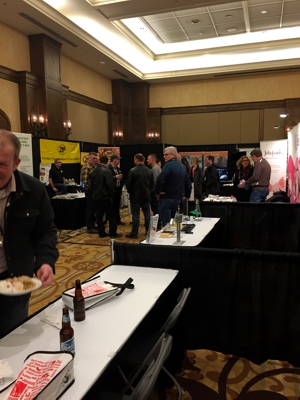
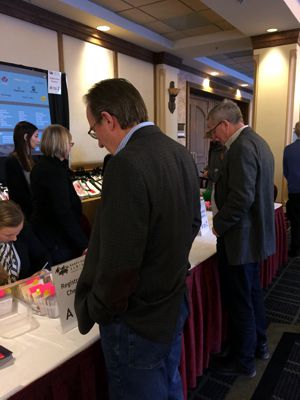
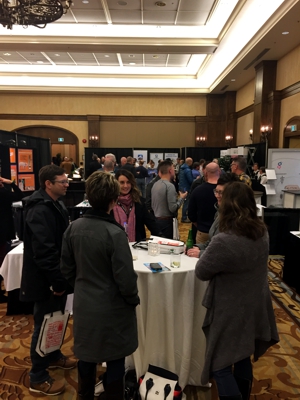
Strong interest in opening canola session
Date posted: Jaunuary 10, 2017
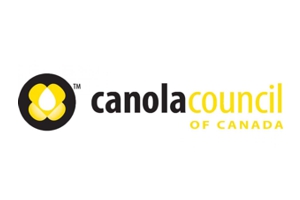
It was a bit of a new idea for this year's Banff Pork Seminar. A free pre-conference research update made available prior to the main Seminar opening.
Judging by the attendance and interest it seemed to appeal to seminar delegates.
Canola meal is an excellent protein choice for pigs and the session was organized by Brittany Dyck canola meal manager with the Canola Council of Canada. Three Canadian swine nutrition researchers who have invested the last several years testing the limits on canola meal inclusion in the diets of weaned pigs, grower-finisher pigs and lactating sows gave presentations.
Dr. Ruurd Zijlstra, Dr. Eduardo Beltranena and Dr. Martin Nyachoti presented their findings and suggestions for successful formulation. The session also included a presentation by Carson Callum of Dow AgroSciences.
"This session was well attended and is an excellent example of the opportunities for industry and others to establish learning opportunities around the main seminar," says Ruurd Zijlstra.
Register for free Canola meal research update at BPS 2017
Date posted: Jaunuary 4, 2017
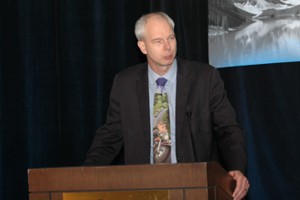 Dr. Ruurd Zijlstra
Dr. Ruurd ZijlstraCanola meal is an excellent protein choice for pigs, and a special pre-conference research update Banff Pork Seminar (BPS) 2017 is the ideal place to learn about it.
Canada's most renowned swine nutritionists have invested the last several years testing the limits on canola meal inclusion in the diets of weaned pigs, grower-finisher pigs and lactating sows. BPS delegates are invited to a special pre-conference discussion on the topic.
Join the discussion and hear Dr. Ruurd Zijlstra, Dr. Eduardo Beltranena and Dr. Martin Nyachoti present their findings and hear their suggestions for successful formulation.
When: January 10th from 2:00 to 4:00 pm
Where: Ivor Petrak room at the Fairmont Banff Springs Hotel
How to register: click here to sign up for this free session
PIC welcomes friends, partners to BPS 2017
Date posted: Jaunuary 4, 2017

PIC is looking forward to Banff Pork Seminar 2017. This event is one of the best opportunities in Canada to engage with our friends and partners in the Canadian pork industry on the challenges and opportunities that lie ahead. Especially the uncertainty around the market outlook, the increasing expectations of consumers on sustainability and animal well-being, and the possibilities that new technologies offer will provide great food for thought.
From PIC's perspective we are focused on developing the best genetics and services to support the Canadian industry in addressing the challenges and capturing the opportunities. We are excited about the future and look forward to meeting you at Banff.
PIC is a Sustaining Sponsor of BPS 2017.
Walk-in registrations welcome at BPS 2017
Date posted: Jaunuary 4, 2017
There is strong registration for Banff Pork Seminar (BPS) 2017 but there will be room for last minute and walk-in registrations according to seminar coordinator, Ashley Steeple.
"It will pay to register as early as possible to help ensure there is seating in the breakout sessions chosen and other conference details," says Steeple. "But the bottom line is that delegates who are not able to make that decision until the last minute will still be able to register on-site."
Fees for registration after Dec. 21, 2016 are $385 plus GST. Check articles in this Inside BPS news blog for specific details on attending this year's event. For additional information contact the Seminar office. Details at www.banffpork.ca.
Topigs Norsvin: Focus on sustainability
Date posted: December 30, 2016
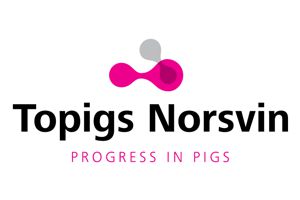
Sustainability is one of Topigs Norsvin's core values. It is reflected in the three well-known Ps. People, Profit and Planet. However, Topigs Norsvin has a unique fourth P: Precision breeding.
People. Pork is increasingly valuable as a source of protein to feed the world's growing population. Pork producers want to see animals that are healthy and easy to rear. They want to sell a top quality pig to the packer and they hate losses due to mortality. We are proud to manage a large group of dedicated scientists who contribute every day to the genetic improvement of Topigs Norsvin's lines. Our goal is to double the genetic progress over the next 10 years.
Profit. People want to buy quality meat at a reasonable price but pork producers need a healthy profit to stay in business. Cost price is therefore the main driver in our breeding goals. Fortunately, sustainability and cost price go hand in hand: Total Feed Efficiency, efficient use of feed throughout the entire production chain, and mortality are main traits in our selection programs.
Planet. Pork producers use a growing number of feed components in pig diets that are not valid for human consumption. Topigs Norsvin genetics contributes to a better efficiency of feed usage in pork production.
Precision breeding. Genomics and biotechnology support our goal of doubling genetic progress over the next 10 years. These technologies are leading us towards precision breeding: genes are analyzed more thoroughly to maximize the benefit our customers obtain from the genetic potential. Then our customers can produce healthy and tasty pork as sustainably as possible.
Topigs Norsvin is a Sustaining Sponsor of BPS 2017.
New BPS app launched for 2017 Seminar
Date posted: December 19, 2016

There's a new way to keep track of all things related to the Banff Pork Seminar (BPS).
A new BPS app has been developed. "Available for Android, Apple, Blackberry, Windows and Access users it will optimize your conference experience and make the most of BPS 2017," says BPS coordinator, Ashley Steeple.
"You can view the agenda, find your sessions, read speaker biographies and abstracts," she says. "Or you can find your way using the integrated floor-maps, chat with fellow delegates, network with exhibitors and sponsors, stay up-to-date with conference announcements and so much more."
The app will be password locked so only delegates can access the information. Usernames and passwords will be sent to delegates, and will be part of their registration package. Target date for the new app to be live is Jan. 5, 2017. Watch the BPS website www.banffpork.ca for details.
Quick last minute tips for delegates to BPS 2017
Date posted: December 19, 2016
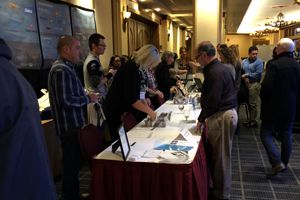
The 2017 Banff Pork Seminar (BPS) is only a few sleeps away. For delegates, here's a quick last-minute checklist from Seminar coordinator Ashley Steeple.
The venue. The Banff Springs Hotel did an excellent job of hosting the Seminar in 2016. The hotel is where BPS began and the hotel staff and the BPS committee have worked hard to make it an even better event for 2017.
Park pass bonus. It's Canada's 150th anniversary and in celebration there is no admission charges to Canada's national parks for 2017.
Still time to register but watch the quota. Registration is available right up to the last day of the conference so delegates can "walk in" and register. If you show up to register at the desk, you will be asked to self-register at a laptop at the registration desk. So it saves time for delegates to register from their own computer, tablet or phone before arriving. There is a quota on registrations and once it is met registrations will be cut off.
Registration payment. If BPS has not received payment for your registration or your group's registration, delegates will not be able to check in and pick up their kits until payment is received. Please ensure the first person to check in from your group is prepared to settle the invoice. Payment by credit card, cheque or cash is accepted.
Breakout sessions. The breakout sessions delegates have selected are printed on their name tags. If you did not choose sessions, the person who registered your group may have chosen for you.
Note that breakout sessions have limited seating and once a session is full, fire regulations prevent BPS from allowing more people in. Please arrive at least five minutes before the session starts to avoid disrupting speakers and other delegates and to ensure you get to see the sessions you want.
Wednesday evening is open. One common comment from past years was that delegates liked the idea of free time on Wednesday evening for personal networking and enjoyment. So there is no formal event planned for Wednesday. Delegates can close the day's breakout sessions with a refreshment from the cash bar in the tradeshow area, then head out on their own at their own pace.
Seminar evaluations. These are critically important to planning future seminars so please fill them out.
Wear your nametag. Name badges will be required for entry into sessions, functions and meals.
Free wireless. There is free Wi-Fi in the hotel and meeting rooms. Password is bps2017.
Banff Airporter Shuttle discount. Anyone arriving by air and wishing to book the Banff Airporter Shuttle can get a discount by booking through the BPS website. Check under the Accommodations and Travel button, Airporter Shuttle tab for promo code and details.
Free downtown shuttles. These will be running between downtown and the Banff Springs during the evening. See the program for times and pickup locations.
Find the latest news at the Inside BPS 2017 Special Report. Get news, photos and the Inside BPS blog in this Special Meeting Report from the 2017 Banff Pork Seminar, presented by communications partner Meristem. Find the special report link on the BPS website home page or directly on the www.meristem.com home page. Follow on Twitter at #Banffpork. Inside BPS Report articles are available with credit for reprint for individual, industry or media use.
Final program handout. A PDF of the 2017 program handout with final details will be on the BPS website www.banffpork.ca in late December. Click on the Program button at the Home page, then on the printable Program PDF tab.
The BPS team looks forward to meeting you in Banff.
Still time to register for BPS 2017
Date posted: December 13, 2016

The registrations are flowing in for Banff Pork Seminar 2017, but Seminar coordinator Ashley Steeple says there is still time to register and be part of the action.
Here are the key details.
There is a quota. Technically registration is available right up to and including walk-in at the conference itself. However, there is a quota and once it's full, registrations will not be allowed beyond that. The best way to ensure you are registered is to do it now.
What you get. Your Banff Pork Seminar registration fee includes an electronic copy of the seminar proceedings, coffee/networking breaks and lunches on January 11 and 12, and an evening reception on January 10, 2017.
Multiple registrant discount. For multiple registrants attending from the same organization, it pays to register all delegates together to receive a group discount – register five delegates, receive the sixth registration free. Register by Dec. 20, 2016 to take advantage of this discount.
Cancellation details. Cancellations received by Dec. 20, 2016 will be refunded minus a $75 per delegate administration fee. Cancellation requests received December 21, 2016 or later will not be refunded. Substitutions are permitted.
Student registration. Conference registration fee is waived for full-time undergraduate or graduate students attending a Canadian post-secondary institution. Students must register by Dec. 20, 2016 or will be subject to full conference fees.
Conference materials. For delegates registered after December 20, 2016, we cannot guarantee all conference materials will be available.
Accommodation. Hotel rooms are going fast so it is advised to book as soon as possible.
Media registration. Please contact the BPS office at 780-492-3651 or .
Media carry the messages from Banff Pork Seminar 2017
Date posted: December 13, 2016
Each year, delegates get to hear great speakers on a variety of topics. It is a lot to take in. That's one reason that media are an important part of the communications cycle.
The world of media is a dramatically changing one but despite all the tools and players today, core media provide a critical link to the world for Banff Pork Seminar (BPS).
At the time of writing, a number of media had signed up to attend BPS 2017. They include Prairie Hog Country, Canadian Hog Journal, Farmscape, Ontario Farmer, Western Producer and Meristem.
These players can be seen rushing from session to session or tracking down players for additional comment and insight. Their efforts feed their own programs and publications but also connect with media across North America and around the world.
"As the pork industry searches for pathways to progress in production effectiveness and public trust, we are thankful to live in a country where open analysis of issues is allowed and celebrated," says Chris Tokaruk, communications committee chair for the 2017 Seminar. "That coverage is important to the integrity of our Seminar."
Part of the BPS communications effort is a Special Report including the Inside BPS blog, feature articles and photos. These articles are available for media support and industry use. The link to the report is available at the Seminar website www.banffpork.ca.
Understanding transportation's growing impact on the pork industry
Date posted: December 2, 2016
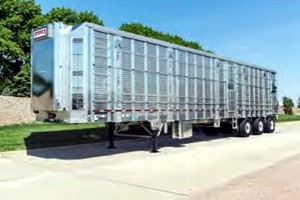
Transportation is perhaps the most visible part of the livestock industry. For many people in the general public, transport trucks hauling livestock are the only place people will see farm animals.
"Media have picked up on animal transport and the public is more aware of some of the issues that can occur during animal transport," says Michael Dyck, Banff Pork Seminar program co-chair for 2017.
"We wanted to look at some excellent research and developments in that area, particularly some of the conditions that exist in a truck and what is happening as the animals move around. And we wanted to look at some of the ethical and welfare concerns that can happen when you are loading, offloading, and in transport as well."
It's a fairly broad topic but one that is very important, says Dyck, and morning breakout session No. 2, has two very qualified speakers.
Geraldine Auston of the Ag and Food Exchange will examine "Animal welfare, animal rights: What's the difference. And Luigi Faucitano looks at "Swine transportation: Science-based solutions to current issues."
Auston is a management consultant with almost 25 years of experience working with food and farming clients across Canada. She has worked with BC Pork, BC Cranberry Marketing Commission and the Canadian Livestock Transport Program. In her role with the Ag and Food Exchange, she provides issues management expertise for businesses pressured by existing and emerging issues surrounding agriculture and food production practices.
Faucitano has been a meat scientist at the Sherbrooke Research and Development Centre of Agriculture and Agri-Food Canada since 1999. He is currently one of the few meat scientists to have a research program aimed at studying the impact of pre-slaughter handling on animal welfare and meat quality in North America. A consultant to the pork industry, scientific community and governmental institutions and speakers, he participated in the revision of Canada's Codes of Practice for the Care and Handling of Pigs and of the Canadian Livestock Transport handbook. He has almost 200 publications between peer-reviewed papers, technical and congress communications, and book chapters.
The people who drive the BPS 2017 program
Date posted: December 2, 2016
Nothing of consequence gets done in this world without commitment of key people. As Banff Pork Seminar rolls toward nearly half a century of industry leadership with its 2017 Seminar, its success comes from people prepared to make that commitment.
The BPS advisory committee structure is designed to bring together strong players from all aspects of the industry, government and academia. The committee draws from people across Canada and is set up with a process of continual renewal, ensuring fresh thinking each year.
Here are the people on the 2017 BPS Advisory Committee.
- Chair: Mark Chambers, Sunterra Farms, Lucan, Ont.
- Program co-chairs: Michael Dyck and Ruurd Zijlstra, University of Alberta, Edmonton
- Conference coordinator: Ashley Steeple, University of Alberta, Edmonton
- Javier Bahamon, Alberta Pork, Edmonton, Alta.
- Stéphane Beaudoin GestBEAu Inc., St-Germain-de-Grantham, Que.
- Neil Booth, Maple Leaf Foods, Landmark, Man.
- Amy Cronin, Cronin Farms, Bluevale, Ont.
- Cam McGavin, Topigs Norsvin Canada, Winnipeg, Man.
- Tom Riek, PIC Health Assurance, Airdrie, Alta.
- Francis Simard, Nutreco, Montreal, Que.
- Casey Smit, Olymel, Humboldt, Sask.
- Chris Tokaruk, Hypor Inc., Regina, Sask.
- Ralph Tuck,PIC Health Assurance, Strathmore, Alta.
- Redge Watt, Fast Genetics, Spiritwood, Sask.
- Ben Willing, University of Alberta, Edmonton, Alta.
- Jason Wood, Alberta Agriculture and Forestry, Edmonton, Alta.
The advisory committee is an open process. Anyone interested in serving on the committee or learning more about its role is invited to contact a current member.
Thanks to 2017 Banff Pork Seminar sponsors
Date posted: December 2, 2016
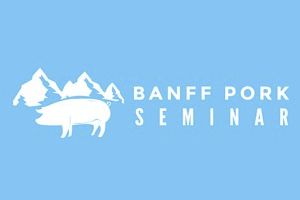
There are 70 plus sponsors for the 2017 Banff Pork Seminar. And that support means direct benefits for delegates.
The first is it dramatically lowers the cost of attending. "This conference has grown to considerable scale in 46 years and to put it on without the financial support of sponsors would cost almost double what we charge," says program co-chair Ruurd Zijlstra. "That's a significant benefit to all delegates."
Co-chair, Michael Dyck says there is an equally important benefit. "Delegate sponsor teams bring knowledge, energy and personality to the seminar and that adds a huge amount of value to networking opportunities throughout the week," he says.
"Here are the 2017 sponsors listed in order of sponsorship category starting with the largest contributors. We thank them all for their support."
Sustaining Sponsors
- Alberta Pork
- Elanco Animal Health
- PIC
- Swine Innovation Porc
- Topigs Norsvin Canada
Premier Plus sponsors
- AFNS, University of Alberta
- Cambridge Global Payments
- DuPont
- Fast Genetics
- Hypor
- Maple Leaf Foods
- Olymel
- Pharmgate Animal Health
Premier sponsors
- Canadian Pork Council
- Canola Council Canada
- Carlo Genetics
- Gallant Custom Laboratories Inc.
- Jupiter Agro-Biotech Inc.
- Masterfeeds
- Maximus Systems
- Merck Animal Health
- New Standard West Equipment
- South West Ontario Veterinary Services
- Western Hog Exchange
Select sponsors
- Agribution Canada Ltd.
- Ajinomoto Heartland, Inc.
- Automated Production (AP)
- Boehringer Ingelheim (Canada) Ltd.
- Chemometec A/S
- Diamond V
- DNA Genetics
- DSM Nutritional Products Inc.
- Dutch Bio Mulcher
- EastGen / IMV
- Farm Credit Canada
- h@ms Marketing Services
- Hi-Pro Feeds
- Hylife
- JBS United
- Jefo Nutrition
- JYGA Technologies Inc.
- Ketchum Manufacturing
- Manitoba Pork
- MOFA Global
- Novus International
- Nutriad, Inc.
- Nutrition Partners
- OENano Inc.
- Pancosma
- Penner Farm Services/Horizon Livestock & Poultry Supply
- Prairie Hog Country
- SEC Repro / Bock Industries
- Sunterra Farms Ltd
- Trouw Nutrition
- UKAL Canada Inc.
- Walbern Agri-Systems (1991) Ltd.
- Western Hog Journal
- Zep Sales & Service
Supporting Sponsors
- Affymetrix
- Aon Risk Solution
- Canadian Bio-Systems Inc.
- Chr. Hansen
- Lallemand Animal Nutrition
- Parks Livestock of Canada
- Praire Swine Health Services
- Steve's Livestock Transport
- Swine Health Professionals Ltd.
- Warman Veterinary Services
- Zantingh Direct Inc.
- Zoetis
Sow housing: Managing the big switch
Date posted: December 2, 2016
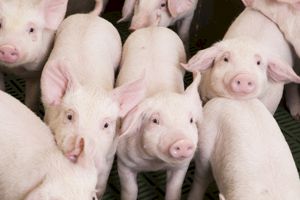
Loose sow housing.
For a time those words shook the swine industry. Challenged with heavy pressure to phase out of sow stalls, the alternative, loose sow housing, seemed like a very costly and fiercely debated alternative.
Fast forward to today and the always innovative pork industry is adjusting to switching to loose housing systems on considerable scale, says Michael Dyck, 2017 Banff Pork Seminar program co-chair.
"It's only fitting that with the interest in this topic across North America and around the world, that Banff Pork Seminar bring together leading speakers of the day to talk the most recent developments.
"We have three excellent speakers: Mark Fynn of Manitoba Pork; Tom Parsons of the University of Pennsylvania; and Kevin Stuckey of Ohio-based Cooper Farms."
Fynn will look at "Avoiding land mines in converting to loose sow housing." Parsons' presentation is entitled "Training Sows & Staff for the Transition from Stall to Pens: The Role of the Human-Animal Interaction" And Stuckey will focus on his company's experience with electronic sow feeding systems.
Mark Fynn completed a graduate thesis on economic and welfare comparisons between two group-housing systems for sows. As manager of quality assurance and animal care programs for Manitoba Pork, he has contributed to developing policy and implementing programs related to pig health and husbandry for pork producers in Manitoba. He has also been involved in a number of national programs and projects in these areas, including the National Sow Housing Conversion Project.
The energetic Parsons is an associate professor of swine medicine in the Department of Clinical Studies, New Bolton Center, University of Pennsylvania, School of Veterinary Medicine and serves as the director of the School's Swine Teaching and Research Center. He was instrumental in the establishment of the school's swine teaching and research center which served as a prototype for the commercial scale implementation of loose sow housing. Over 180,000 sows on 75 farms across the U.S. and Canada have adopted the basic pen gestation systems developed at school's swine center. He also has built one of the largest research groups working on sow housing in North America in an effort to address questions gleaned from his experiences helping farmers transition in to loose sow housing.
Stuckey is involved with the vertically integrated Cooper Farms. He brings a large-scale business and practical farm management perspective to this discussion.
"That broad and current experience will give BPS delegates a chance to learn from presentations and ask questions of these key players in loose housing," says Michael Dyck. "We expect strong interest in afternoon breakout # 6."
Labor session expected to draw strong interest
Date posted: December 2, 2016
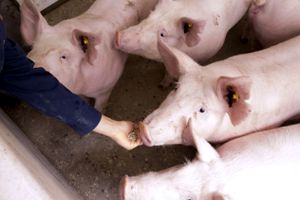
Few issues have been as pressing a challenge to the pork industry and the agricultural industry as a whole as labor. Finding and keeping qualified help is more critical to business success today than ever.
"The pork industry is getting creative at management solutions and more aggressive at understanding and shaping the regulatory environment," says Banff Pork Seminar program co-chair, Ruurd Zijlstra. "As a result, labor developments were something our committee felt was important to feature at the 2017 Banff Pork Seminar."
Morning breakout session No. 4 features two strong speakers on the topic and early signs are this will be a popular one with delegates, he says.
Kristen Cumming of Cantos Performance Management looks at "Building, managing and retaining high performance teams." And Ken Linington of Flowers Canada- Growers Inc. brings a perspective on the "Changing landscape of labor regulations."
Cumming is a speaker, facilitator and trainer focused on improving the connection between people and their work. With an agricultural background and 20 years' experience supporting organizations in retention, engagement, performance management and leadership, she is passionate about rural sustainability. She operates a successful consulting practice and is an instructor with the Bachelor of Economics in Business Management program with the University of Alberta.
Linington is a policy advisor for an Ontario agricultural employers group known as the Labour Issues Coordinating Committee, a coalition of agricultural commodity and general farm organizations representing the interests of Ontario Farm employers. Formed in 1991 to develop consensus in the farm employer community on employment and labor related issues, and represent their collective position to government, industry friendly regulations is a primary goal.
Linington also sits on the Board of the Canadian Agricultural Human Resources Council.
Special Meyer, Grier plenary session will wrap up BPS 2017
Date posted: November 04, 2016
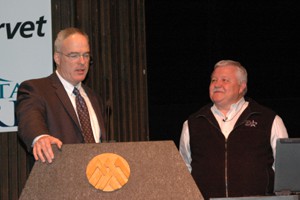
Kevin Grier (left) and Steve Meyer are popular presenters
They are two of the most knowledgeable livestock marketing specialists on the planet, and two of the most entertaining. Especially when working together.
Steve Meyer and Kevin Grier will tackle a tough topic, "Is the retooling over or just beginning?" in a special Banff Pork Seminar (BPS) plenary session at 4 p.m. Thursday, Jan. 12, 2017. Meyer is with Express Market Analytics and Grier with Kevin Grier Market Analysis and Consulting Inc.
"We had these two do a joint presentation a few years back and they had a chemistry that obviously hit the mark with delegates because each year we get requests to bring them back," says Seminar program co-chair, Ruurd Zijlstra. "So for 2017 BPS we did."
This closing BPS session will replace the Boar Pit which wrapped up the Seminar the past few years, he adds.
"We wanted to try something different and yet retain some of the comfortable informality of the Boar Pit discussions," adds program co-chair Michael Dyck. "This format allows us some new options because we are not as constrained by the time limits we have with morning plenaries so discussion can continue up to an hour.
"The session will allow plenty of time for questions and audience participation. We want to encourage good discussion and we encourage people to stay around afterwards, have a refreshment and visit. Maybe even wrap up their stay with some socializing."
Delegates should note this plenary will start at 4 p.m. and run for about an hour, and adjust their travel schedules accordingly, says Zijlstra. "We believe this will close the Seminar and send people home with a positive feeling and fresh knowledge to make good decisions in their own operations and organizations."

Ashley Steeple, BPS coordinator
Don't miss early BPS 2017 registration Nov. 15
Date posted: November 04, 2016
Here's a fast way to save $50 a delegate for the 2017 Banff Pork Seminar (BPS). Don't miss the Nov. 15 early registration deadline.
"We also offer a group discount for people from the same farm, company or organization," says Ashley Steeple, BPS coordinator. "Register five people at the same time and receive a sixth delegate registration free.
"You can check all those details out at the 'registration' tab on the Banff Pork Seminar 2017 website www.banffpork.ca."
Breakout session tackle core business, production topics
Date posted: November 1, 2016
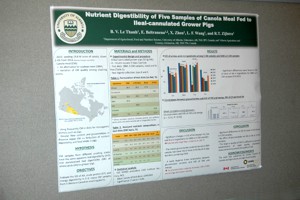
Winning student awards are part of the special Wednesday Innovators breakout No. 8
They are known as the meat and potatoes of the Banff Pork Seminar. Each year, breakout sessions tackle the latest information on the most pressing production challenges and opportunities.
There are eight breakouts and delegates can choose four, two morning and two afternoon sessions to attend over the two days. It's a good idea to register early because there is a limited capacity in some rooms and the most popular ones can fill up quickly.
Seminar co-chairs for the 2017 program, Ruurd Zijlstra and Michael Dyck give a snapshot of breakout session highlights for delegates.
Swine health. One speaker in this session tackles disease spread through feed ingredients; a second looks at our readiness for dealing with a foreign animal disease.
It's been clear that poor biosecurity is part of the reason for the spread of PED, particularly in the U.S. And part of that spread may have been through contaminated feed ingredients. PED is a recent test of industry preparedness on foreign disease.
Animal transport issues. Media has picked up on the issue of animal transport and as a result the public is more aware. This session looks at the difference between animal rights and animal welfare as well as science-based solutions to animal transport issues. Learn more about the conditions on trucks and what happens as animals move around, as well as ethical and welfare concerns when loading, offloading and in transport.
Sow productivity. The feedback was clear from previous years: Sow productivity is a topic producers want addressed at BPS. There are leading speakers in two separate presentation topics for what should be some outstanding discussion of sow physiology as well as nutrition and management of the sow.
Labour management. How to build and maintain high performance teams is critical to success. The continually evolving labour landscape is also examined.
Breeding technologies. This session features the George Foxcroft Lectureship in Swine Production. This year's recipient is Stephen Webel of JBS United speaking on current strategies and technology for reproductive management of gilts and sows.
Some recent research focuses on sexing technologies and pig genetics. Kilby Willenburg of Fast Genetics will give some perspective on using sexed semen for AI in pigs and discuss the actual application and potential of the technology.
Genome editing has gained a great deal of traction in the scientific world. A bit different than genetic modification of the past, it uses cellular mechanisms to make slight changes in the genome.
There has been work done to produce pigs that are resistant to certain strains of PRRSV using genome editing. Randall Prather of the University of Missouri is in high demand as a speaker due to his recent research in this area.
Sow housing conversions. More of the pork industry is moving to loose housing. This breakout session has three well-experienced speakers covering the topic from several angles including avoiding the landmines in switching to loose housing, and training pigs and people for the transition.
Reduced antibiotic use. Reduced antibiotic use is one of the key topics to be addressed by the North American livestock industry including the pork industry. Three excellent speakers are in this session. Leo den Hartog of Trouw Nutrition in the Netherlands will address some of the nutritional strategies implemented in Europe. Martin Nyachoti, of the University of Manitoba discusses his research on feed additive alternatives. And Ben Willing from the University of Alberta talks some of the underlying mechanisms as to how antimicrobial organisms in the gut relate to gut health.
Innovators' session. This session runs Wednesday only, but it's always a popular one. It will feature an overview the winning technologies in the Aherne Prize for Innovative Pork Production, as well as finalist presentations from the R.O. Ball Young Scientist student competition.
More information
The 2017 Banff Pork Seminar runs Jan. 10 to 12 at the Banff Springs Hotel, Banff, Alta. Full details including breakout session speakers are available at www.banffpork.ca.
Powerful plenary sessions anchor 2017 Banff Pork Seminar program
Date posted: November 1, 2016
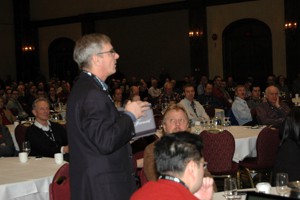
Plenary sessions discussion from 2016
The pork industry has changed rapidly over the past few years. The 2017 Banff Pork Seminar has built its program around that fact. The Seminar is slated for Jan. 10 to 12, 2017 at the Banff Springs Hotel in Banff, Alta.
"We picked a theme 'Innovative and sustainable solutions for an evolving industry' and we've built around that a powerful program that tackles the big issues of the day and balances that with the very best production information that producers can implement immediately," says Seminar program co-chair, Dr. Ruurd Zijlstra of the University of Alberta.
"It used to be there was resistance to change in the pork industry," adds co-chair Dr. Michael Dyck, also of the University of Alberta. "Today the pork industry is much more accepting of change and in fact at times actively searches it out for the opportunities it brings.
"Whether it is self-imposed changes or change driven from outside forces, the industry realizes it has to be innovative to sustain itself and maintain the ability to meet the challenges of feeding a hungry world over the short and long-term and do that sustainably."
Feeding a hungry world
The opening four plenary sessions bring strong speakers on key topics.
Wednesday plenary sessions include Sandra Vijn of the World Wildlife Fund (WWF) on "Feeding the planet – animal protein challenges."
The WWF has indicated that an interesting balance exists between intensification of agriculture and maintaining natural habitat worldwide, says Zijlstra. The WWF works in the field of wilderness preservation and reducing humanity's footprint on the environment.
Complementing that presentation is Dr. Frank Mitloehner of University of California Davis. He'll tackle "How to satisfy the rising demand for animal protein without depleting natural resources."
Mitloehner is an excellent speaker, says Zijlstra, very in tune with the resources and components of the animal production system, how they come together and how they can be balanced so they are done sustainably.
Better communications
Thursday's morning plenaries focus on communications. The pork industry has been cast in a bad light in some ways and needs to change the public perception, says Michael Dyck. "We wanted to learn how others who have faced this same situation have dealt with it."
On Thursday, Terry O' Reilly of CBC Radio One fame will do just that with his presentation "Changing the conversation." That will be followed by the popular Dr. Joe Schwarcz of McGill University speaking on "Countering public misconceptions of agriculture."
A new closing plenary session on Thursday afternoon at 4 p.m. features two well-known industry specialists Steve Meyer of Express Markets Inc. Analytics and Kevin Grier of Kevin Grier Market Analysis and Consulting. They'll send delegates home with fresh thinking on a tough subject that's on everyone's mind: "Is the re-tooling over or just beginning?"
Making business sense of a trip to Banff Pork Seminar 2017
Date posted: October 25, 2016
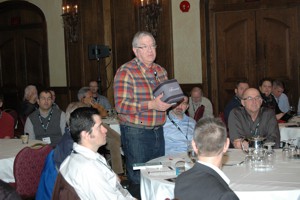
Active discussion at BPS 2016
It's a bit of a cost to attend a major seminar like Banff Pork Seminar (BPS). To get the most out of that investment, more people are looking at this three-day Seminar as more of a Seminar week, full of activities, meetings and related consultations.
"I think the Seminar has grown beyond just being an outlet to present information, into an opportunity for people to get together and network and attend meetings," says BPS chair Mark Chambers. "People come to see the people that are there. It's networking, foundation building, relationship and team building."
Chambers gets to see this from the perspective of a large and small producer. From his committee work and many years of attending meetings, he offers four tips to get full business value out of the BPS experience.
Set up some meetings. Have a plan to use the seminar for networking and extending the week.
"Our company Sunterra uses the week to hold our production meeting on the Tuesday. We know there are people coming in for the seminar from across Canada, U.S. and globally and there is a huge opportunity to have them attend your meeting. So you get to have people in person that maybe you've talked to but never met.
"For us, and many others, it's become pretty critical that the seminar is more than just a couple of days of presentations. It's a business opportunity, a unique learning destination.
"Whether you are coming as an individual or a team there's huge value in building teamwork, spending time in a work environment and then spending social time together in evening. It's difficult to put a price tag on that."
Make your own farm panel. Peer advisory panels are valuable in agriculture. BPS gives producers a chance to build their own personal one.
"It's really critical s a small producer to get acquainted with more people in a broader industry to insure they are keeping up with advancements in technology and innovation," says Chambers.
"Sometimes larger companies can be more innovative because they have the resources to take on some of those projects where smaller producers don't have that opportunity. If you are coming as an individual, BPS is a good place to hear these presentations, talk to presenter directly and meet people and talk about issues.
"Face-to-face meetings can develop into useful longer-term relationships. You are more likely to contact someone you have met. You can essentially use BPS to build your own farm panel."
Work the marketplace. The leading edge companies and organizations use a leading Seminar like BPS to set up exhibits and connect with potential customers. But veteran BPS delegates say the marketplace has evolved from a focus on transitions to business relationships and industry networking.
"Industry players work hard to keep current with developments and take pride in being a business resource," says Chambers. "The marketplace is conveniently located in the heart of the activity at BPS making it a great opportunity to tap that knowledge and experience."
Have some fun. Scan any business book section in a bookstore and library and there will be plenty of topics around work life balance.
BPS takes place in one of the most widely recognized naturally beautiful spots in the world. So a lot of people make a specific point of taking time for some recreation time and socializing, says Chambers.
"It's hard to put a value on getting to know customers or coworkers better personally, but that side is generally recognized as a new value in today's busy world."
Book hotels early, avoid the Canada 150 rush
Date posted: October 25, 2016

Canada celebrates its 150th birthday in 2017 and one of the gifts to the people is free admission to Canada's national parks.
That may mean increased traffic throughout the year and that could put significant pressure on hotel rooms.
Couple that with a consistently strong attendance at Banff Pork Seminar and that makes another good reason to book early.
Full registration details including online registration are available at www.banffpork.ca. Rooms at the Banff Springs are available at the special conference rate while supplies last, until Dec. 1, 2016.
Mark Chambers new chair for BPS 2017
Date posted: October 25, 2016

Mark Chambers, 2017 BPS chair
There is a new face heading up the organizing committee for Banff Pork Seminar 2017.
Mark Chambers, senior production manager with Sunterra Farms takes over.
In many ways, Chambers represents the characteristics of the Seminar delegates today.
Like the diverse group that travel from many areas of North America and globally to attend, he has broad experience. Emigrating from Britain 20 years ago he worked up through the ranks at Sunterra, and now living in southwestern Ontario with Sunterra, with responsibilities for North America.
He has a keen interest in education and knowledge transfer, and has been involved with many aspects of industry education and engagement.
"I enjoy working and facilitating making things better. I especially enjoy taking the good parts of our industry and relaying information to producers that they can take home and implement and make a difference.
"I've been involved in Red Deer swine technology workshop, and have been involved with labor needs through Sunterra. I'm now co-chair of the national labor task force, working to streamline a lot of farm worker programs to work. One target is to improve and retain more Canadians in our industry to ensure we have a competent workforce."
That background and energy drives Chambers' vision for the Banff Pork Seminar.
"We want to make sure there is a balanced program every year," he says. "We don't want it to be too academic but we don't want it to be too primary producer either.
"The program committee tries to keep the program current with what is happening in the industry and in the world. It needs to be geared to the relevancy of the industry in North America, because that's our biggest audience, but also to cover things going around the world.
"It's a world renowned seminar and we have some world class speakers there so some very high level information there. And we have breakout session with information that producers can take home and maybe make work on their farm next week."
"I'd like to see the seminar grow, would like to see more producer attend," he adds. "We get a lot of industry related people there but would like to see more producers there as well because those are the guys actually generating the income opportunities for our industry."
Media registration for 2017 Banff Pork Seminar
Date posted: October 20, 2016
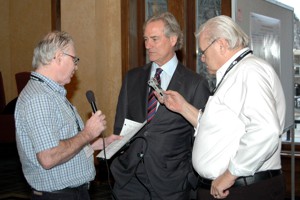
The Banff Pork Seminar plays an important leadership role in the pork and agricultural industry and the media are a key part of that effort.
"Media will find value in the presentations on key topics from leading-edge speakers, but also in the stories they flesh out on their own from additional interviews and discussions," says seminar coordinator Ashley Steeple.
"We appreciate the effort that goes into that coverage and to provide accurate informat6ion to the pork industry and the general public."
As always, media are welcome to attend the 2017 Seminar.
For background information on media registration and a media registration form for the 2017 Banff Pork Seminar click here. Or to speak to someone directly call the Seminar office by phone at (780) 492-3651, or by email at .
Calling on nominations for the 2017 Banff Pork Seminar Aherne Prize
Date posted: October 20, 2016
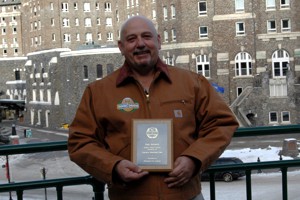
2016 Aherne Prize winner:
Sam Gelowitz, Prairie Swine Centre.
One of the most popular events at the annual Banff Pork Seminar is the awarding of the F.X. Aherne Prize for Innovative Pork Production.
"The prize recognizes those individuals who have developed either original solutions to pork production challenges or creative uses for known technology," says Aherne Innovator committee chair Ben Willing of the University of Alberta.
Any innovation big or small can be entered. Not all innovations are complex – simple ideas can be very effective solutions. Entry deadline is Oct. 31, 2016. Contest details are on the Seminar website www.banffpork.ca.
"The innovation can apply to any segment of the pork industry including feeding; breeding; ventilation; disease control and prevention; transportation; manure management; animal handling; facility or enterprise management; and pork quality and safety.
The contest is open to owners, production managers, herdspeople or consultants in the North American pork industry, or anyone who has developed an innovation relevant to the North American pork production industry.
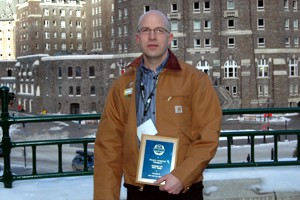
2016 Aherne Prize winner:
Steve Brandt, Steve's Livestock Transport
The prize is significant: Free conference registration, accommodation at the Fairmont Banff Springs Hotel and travel for the Banff Pork Seminar Jan. 10 to 12, 2017 for up to two innovators. The prizes include registration and travel valued at $2,000 each, along with the outstanding opportunity to have their innovations highlighted at this leading pork industry conference.
The award is named after the late Dr. Frank Aherne, a professor of swine nutrition and production at the University of Alberta in Edmonton and a major force for science-based progress in the western Canadian pork industry.
Registration checklist for 2017 BPS
Date posted: October 20, 2016

You're coming to Banff Pork Seminar (BPS) 2017. To help with your planning, Seminar coordinator Ashley Steeple has put together a quick checklist of key things to consider.
Check the timing. The Seminar moved a week earlier last year and that time is continued for the 2017 Seminar.
Same venue but book early. BPS is back at its original home, the Banff Springs Hotel but accommodation is expected to be tight in Banff in Canada's 150 celebration year.
Presentations and people. Your Banff Pork Seminar registration fee will get you in to hear some of the best speakers on the leading issues of the day. Equally important is the networking opportunity with a large group of delegates. Your registration also includes a copy of the seminar proceedings, coffee/networking breaks and lunches on Jan. 11 and 12, and the welcome reception on Jan. 10.
Pick your breakouts. You get a choice of two morning and two afternoon breakout sessions. The most popular ones can go fast so book early.
Save with early registration. Register by Nov.15, 2016 and receive an early registration discount of $50 per delegate. Late registration begins Dec 21, 2016.
Group discounts. For multiple registrants attending from the same organization there are group discounts available. Check the BPS website for more information.
Student registration. Conference registration fee is waived for full-time undergraduate or graduate students attending a Canadian post-secondary institution. Students must register by Dec. 20, 2016 or will be subject to full conference fees.
Online registration. It will be available right up until Jan. 10 provided space is available.
Cancellation. Cancellations received by Dec. 20, 2016 will be refunded minus a $75 per delegate administration fee. Cancellation requests received Dec. 21, 2016 or later will not be refunded. However, substitutions are permitted.
Media registration. Media are welcome to attend but asked to register. Check with BPS for details.
Full registration details including online registration are available at www.banffpork.ca.
Getting the scoop on Banff Pork Seminar 2017
Date posted: October 20, 2016

This special Report is called Inside BPS Special Meeting Report 2017.
It is produced by Meristem editors in partnership with the BPS organizing committee and in simple terms it's designed to give you the "scoop" on the upcoming 2017 Seminar.
If you check the website next to this Report you will see similar reports for several years back. Check them out and you will see this relationship has continued for many years and it's one we at Meristem are proud to continue again this year.
Over the past nearly half a decade the impact of this Seminar has been undeniable. It shines a light on a rapidly evolving modern, global pork industry and a window into agricultural issues and developments on a broad scale. That's why you will see delegates come from across North America and around the world.
The information in this Special Report – including blog items and news features – is designed to be available for use by media and industry, with credit to the source. Here are a few key points on the full BPS 2017 communications effort.
Action central. The best place to get everything you need to know about the 2017 Seminar, Jan. 10 to 12 is the Seminar website www.banffpork.ca.
Inside BPS blog. These blog items will provide key information and perspective prior to, during and immediately following the 2017 seminar. Blog items are designed for use by media, industry communications specialists, producers and others in the industry. Simply provide a credit line to the Inside BPS Special Report and a live link to the Meristem website www.meristem.com.
News releases and news features. While these are primarily designed for media and for industry communications specialists, they are available for anyone to use and are available for reprint. News releases can be used without requirement to provide credit. News features should be credited to the Banff Pork Seminar 2017 and linked to www.meristem.com.
Photos. A range of photos of selected speakers will be provided and are available for use. Please credit the Banff Pork Seminar.
Media assistance. As in past years, media assistance is available. You can find contact information and other key details under the "Media Assistance" link in the top right column of this Special Report web page.
Social media. Information and links to stories on BPS will also be featured on social media. Watch for regular updates under the #BanffPork hashtag. Follow the Banff Pork Seminar at Twitter handle @BanffPork and on the BPS Facebook Page. Follow NewStream by Meristem at Twitter handle @NewStreamTweets.
There are always questions, and the Banff Pork Seminar organizers are committed to providing their best answers for you to make your time in Banff a truly memorable one. Welcome to Banff Pork Seminar 2017.

